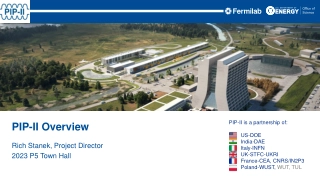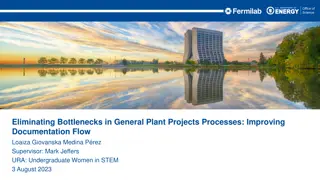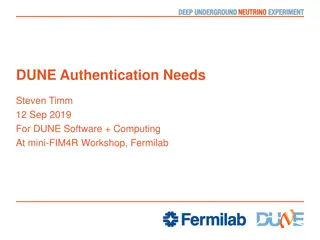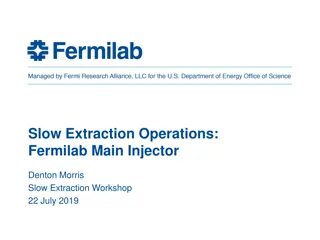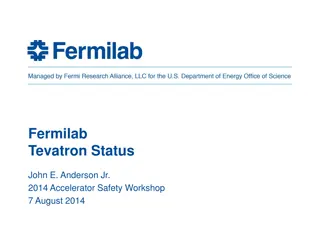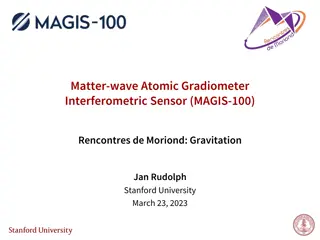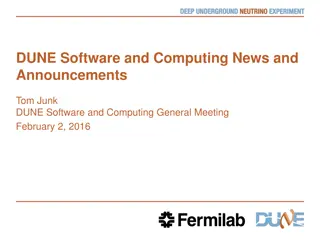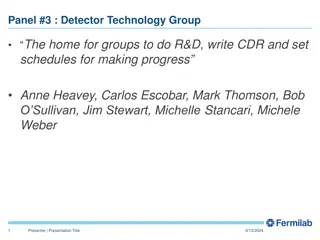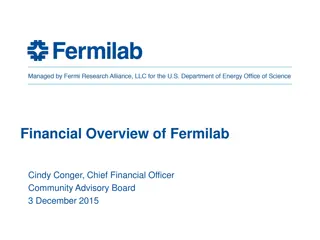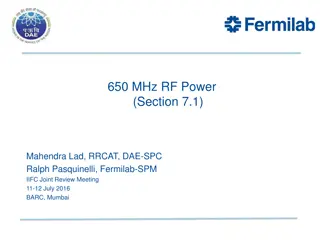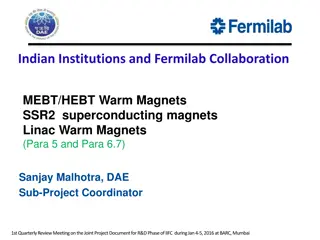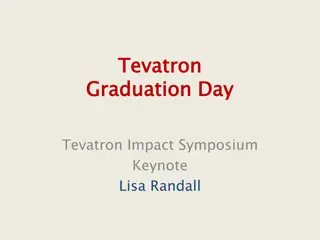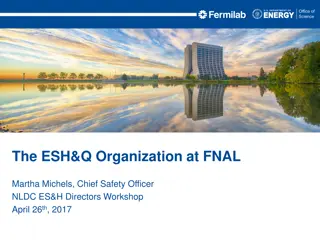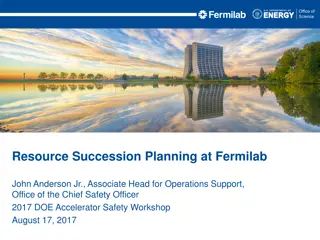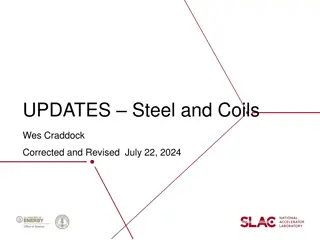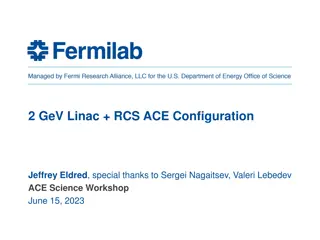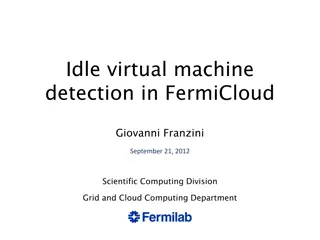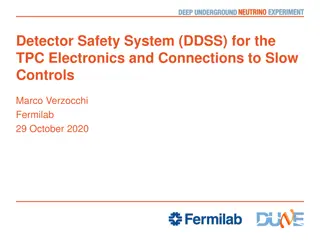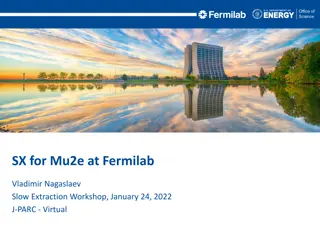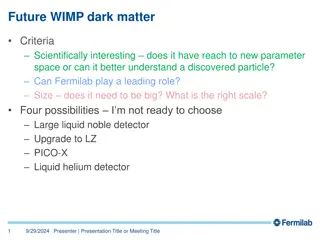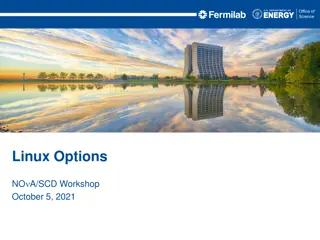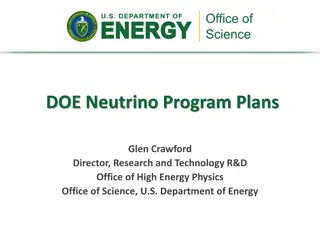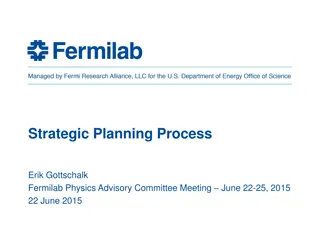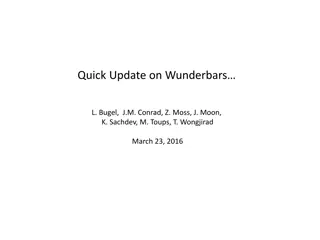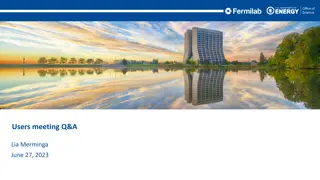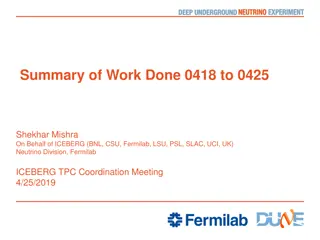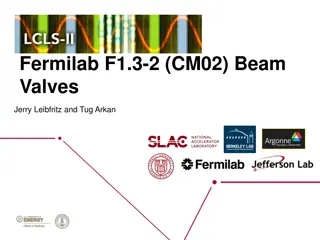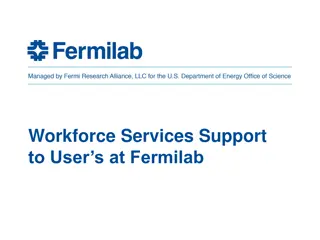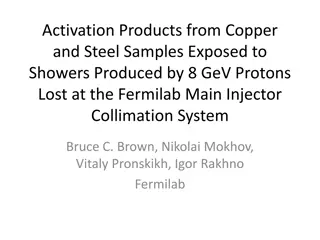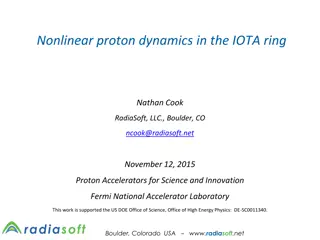Overview of PIP-II Partnership and Mission
PIP-II is a partnership involving various international institutions such as US-DOE, India-DAE, Italy-INFN, UK-STFC-UKRI, France-CEA, and more. The mission of PIP-II is to upgrade Fermilab's accelerator complex to enable the world's most intense beam of neutrinos and sustain a broad physics program
0 views • 18 slides
Enhancing Project Management for General Plant Projects at Fermilab
Improving documentation flow and eliminating bottlenecks in general plant projects at Fermilab can lead to successful project execution, enhancing credibility, reputation, and access to future funding. The Infrastructure Service Division (ISD) plays a crucial role in efficiently managing real and pe
1 views • 15 slides
Exploring Dark Sector Particles at Fermilab PIP-II and Beyond
The DAMSA experiment at Fermilab PIP-II aims to search for Dark Sector Particles (DSP) using a high-intensity proton beam facility. By focusing on Axion-like particles and employing specific physics strategies, DAMSA seeks to penetrate the low mass regime and discover rare particles in unexplored ki
6 views • 22 slides
Employee Assistance Program at Fermilab
Fermilab's Employee/Users Assistance Program offers comprehensive online, telephone, and virtual services for employees, household members, and users at the lab. Services include counseling, legal and financial consultations, work/life referrals, and new offerings like life coaching and personal ass
0 views • 5 slides
Challenges in DUNE Computing: Addressing Authentication and Authorization Needs
DUNE, a long-baseline Neutrino experiment, faces computational challenges in managing authentication and authorization requirements for its data management and computing operations. This involves evolving current schemes to accommodate the anticipated growth in data volume and distribution across mu
1 views • 12 slides
Slow Extraction Operations at Fermilab Main Injector
Overview of slow extraction operations at Fermilab Main Injector, covering beam transport, low to medium energy user test beams, Drell-Yan experimental beam, and spill procedures. Details on beam targets, production, and observation of high-energy positrons. Also, insights on spill regulation techni
0 views • 12 slides
Safety Assessment and Accelerator Safety Envelope Review
Overview of the Safety Assessment Document (SAD) and Accelerator Safety Envelope (ASE) process for the 400 MeV Test Area (MTA) at Fermilab. The document details the shielding assessment, approval process by various committees, and updates made to the SAD chapters and the Accelerator Safety Envelope.
4 views • 8 slides
Overview of Fermilab's Tevatron Accelerator Facility
The Fermilab Tevatron was once a powerful particle accelerator in the US, known for significant discoveries such as the Top Quark. Currently, the Tevatron is effectively mothballed for safety reasons, with measures taken to secure the facility. This includes removing cryogens, disconnecting power su
0 views • 7 slides
Cutting-Edge Developments in Gravitational Wave Detection at MAGIS-100
Discover the groundbreaking MAGIS-100 Matter-Wave Atomic Gradiometer Interferometric Sensor, a 100-meter baseline atom interferometer under construction at Fermilab. Explore the mid-band science potential, sky localization precision, and long-baseline AI applications for gravitational wave detection
0 views • 15 slides
Latest Updates from DUNE Software and Computing
Explore the latest developments in DUNE Software and Computing including new websites, hardware upgrades, Redmine sites, CILogon certificates, and important announcements on AFS shutdown at Fermilab. Stay informed about changes and enhancements within the DUNE project.
0 views • 13 slides
Detector Technology Group: Research & Development Strategies
The Detector Technology Group focuses on R&D for detector technology, setting schedules to make progress. Discussions include short-term approaches for describing detectors, collaboration participation, and decision-making. Activities at CERN and Fermilab are reviewed to address any missing R&D area
0 views • 8 slides
Financial Overview of Fermilab - Insights from Fiscal Year 2015
Fermilab, operated by Fermi Research Alliance LLC, receives over 99% of its funding from the Federal Government, mainly through the Office of High Energy Physics. The FY2015 financial results show total revenue of $382,272,583 with expenses covering various categories like salaries, subcontracts, an
0 views • 7 slides
Development of 650 MHz RF Power Systems for PIP-II Linac
The project involves designing and fabricating 325 MHz and 650 MHz RF power systems for PIP-II Linac. Various milestones, including the development of 40 kW RF systems, testing prototypes, and collaboration between RRCAT and Fermilab, are outlined. The high-level goal is to achieve specific power le
0 views • 16 slides
Collaboration Between Indian Institutions and Fermilab for Magnet Production
Collaboration between Indian institutions and Fermilab for the production of various magnets for the Medium Energy Beam Transport line, including warm and superconducting magnets. Updates on the progress, deliverables, recommendations for series production, and key milestones discussed during the 1s
0 views • 12 slides
Novel Clean Assembly Techniques and In-Situ Mitigation Processes at TTC2023 Fermilab
Explore innovative clean assembly techniques, in-situ mitigation strategies, and recovery processes at the TTC2023 Fermilab event, focusing on preventing dust particle contaminations, maintaining on-line performance, understanding field emissions, and mitigating contaminations in cavities and cryomo
0 views • 4 slides
J-1 Exchange Visitor Program Rules and Responsibilities Overview
This comprehensive overview provides essential information for J-1 visa holders participating in Fermilab's programs. It covers program rules, obligations, responsibilities, and the role of the Visa Office. Additionally, it highlights the importance of compliance with DOS regulations, SEVIS records,
0 views • 29 slides
Risk Assessment of Rotating Coil System at Fermilab
This document provides a comprehensive risk assessment of the rotating coil system at Fermilab, outlining risks associated with design, operation, cable spooler, probe motion system, and software development. It discusses hardware components, measurement systems, backup plans, and safety measures fo
0 views • 7 slides
Celebrating the Impact and Legacy of Tevatron: A Reflection on Particle Physics
Today, we honor the impact and legacy of the Tevatron, highlighting its contributions to science, technology, and creative scientific thinking. From graduation ceremonies to momentous transitions in particle physics, this reflection touches on key experiences, learnings, and insights gained from inv
0 views • 34 slides
Evolution of ESH&Q Organization at Fermilab
The ESH&Q organization at Fermilab, led by Chief Safety Officer Martha Michels, has undergone evolution to establish clear roles, efficient processes, and sustainable programs. With a focus on lower costs and enhanced programs, the organization has centralized its operations and set strategic goals
0 views • 14 slides
Evolution of ESH&Q at Fermilab: A Comprehensive Overview
Discover the evolution of Environment, Safety, Health, and Quality (ESH&Q) practices at Fermilab under the leadership of John Anderson Jr. Learn about the establishment of clear goals, roles, and responsibilities, the implementation of efficient processes, and the development of sustainable programs
0 views • 14 slides
Steel Plates Sourcing Proposal and Water Jet Cutting Options
A detailed proposal recommending Nucor Steel for steel plate sourcing due to its modern facilities and proximity to Fermilab. The proposal outlines pricing, waste calculations, and contact information for key personnel. It also discusses water jet cutting options provided by Schawn Ayers and North S
0 views • 19 slides
Evolution of RCS Design and Upgrade Process at Fermilab
The Fermilab accelerators have undergone significant upgrades over the years, with developments such as the 2 GeV Linac, RCS design improvements, and the Snowmass 2.4 MW upgrade with RCS. Key advancements include enhanced beam intensity, better orbit control, and reliability. Various parameter varia
0 views • 32 slides
Optimizing Resource Utilization in FermiCloud: Idle VM Detection Project
FermiCloud and FermiGrid at Fermilab aim to maximize computing resources by identifying and minimizing idle virtual machines (VMs) in FermiCloud. The project focuses on developing a system to detect idle VMs, reclaim resources, and allocate them efficiently for scientific data processing in FermiGri
0 views • 18 slides
Detector Safety System (DDSS) for TPC Electronics and Connections to Slow Controls
The Detector Safety System (DDSS) for TPC Electronics involves multiple protection levels including slow controls, PLC-based systems, and fuses/diodes to ensure detector safety. It's crucial to consider these aspects during the design phase as modifications post-design are challenging. The system, d
0 views • 20 slides
Overview of Mu2e Slow Extraction Workshop at Fermilab by Vladimir Nagaslaev
This content discusses the Mu2e project at Fermilab, focusing on slow extraction techniques for beam delivery. It covers beam facilities, characteristics of Muon Campus, design requirements, beam losses, new MARS simulations, and losses in the extraction beam line. Details include beam kinetics, spi
0 views • 17 slides
Future Prospects in Dark Matter Research at Fermilab
Exploring new avenues in the realm of dark matter research, Fermilab stands at the forefront with potential upgrades to their detectors, such as the LZ and PICO-X. The presentation delves into the scientific criteria influencing the choice of detectors, the pursuit of understanding dark matter and d
0 views • 6 slides
Evaluation of Linux Distribution Options by CERN and Fermilab
CERN and Fermilab are evaluating Linux distribution options and have decided to target CentOS Stream 8 as the standard distribution for experiments. Red Hat has proposed an academic licensing scheme, but concerns exist about its applicability. CentOS Stream 8 is considered low risk and has been runn
0 views • 6 slides
Neutrino Program Plans and Recommendations by U.S. Department of Energy
The U.S. Department of Energy's Neutrino Program outlines significant changes and recommendations to pursue neutrino mass physics. These plans include international collaboration, short and long-baseline experiments at Fermilab, and the selection of small-scale experiments to address beyond the thre
0 views • 9 slides
Strategic Planning Process at Fermilab: Overview and Goals
Strategic planning at Fermilab involves aligning with the P5 plan for the U.S. particle physics community, engaging more people in the process, and communicating lab strategies effectively. The plan focuses on six key themes, including Neutrino Science, with specific goals and objectives to support
0 views • 20 slides
Optimization of Wunderbar Production Process
Mitigating factors contributing to wunderbar-making issues, a transition to using a dipping machine, and data analysis for coating effectiveness were discussed. Experiments on different gas fills, control of coating thickness, humidity effects, and plans for future lightguide production were highlig
0 views • 6 slides
Understanding Access Changes and Community Relations at Fermilab
Access to Fermilab has become more complicated due to changing DOE guidance and security posture. Efforts are being made to streamline access while addressing security gaps. Public access to outdoor areas of the Fermilab campus is still encouraged, but communication regarding access changes needs im
0 views • 12 slides
Neutrino Division Work Summary: 0418-0425
Shekhar Mishra conducted various tests and coordination activities on behalf of ICEBERG Neutrino Division at Fermilab. FEMB tests with BNL firmware revealed responsiveness improvements in LN2 compared to air. Furthermore, FEMBs in CTS with DAQ displayed consistent channel behavior differences betwee
0 views • 4 slides
Troubleshooting CM02 Cold Gate Valves at Fermilab
Issues have arisen with the CM02 cold gate valves at Fermilab, affecting the operation and reliability of the valves. Problems include leakage, improper sealing, and unexpected pressure differentials during installation, leading to the introduction of gases into the cavity string. Detailed descripti
0 views • 8 slides
Workforce Services Support at Fermilab
Workforce Services at Fermilab provide comprehensive support to users, assisting with ID badge requests, computing privileges, visa information, and more. They offer guidance on lab procedures, local resources, and communication channels through designated points of contact. The Visa Office aids wit
0 views • 9 slides
Activation Products Analysis at Fermilab Main Injector
Explore the study on activation products from copper and steel samples exposed to showers produced by 8 GeV protons at Fermilab Main Injector Collimation System. Delve into radiation issues, maintenance planning, and fitting formulas to analyze residual radiation using half-life weighted beam loss.
0 views • 22 slides
Nonlinear Proton Dynamics in the IOTA Ring: Advancements in Beam Acceleration
Probing the frontier of proton acceleration, this research delves into nonlinear dynamics within the IOTA ring, showcasing integrable optics and innovative technologies. Collaborations with Fermilab drive advancements in accelerator science, supported by the US DOE. The study explores variational as
0 views • 21 slides
